#pipi knows she's devastating you but she knows how to do it in a balanced way
Text
烈火浇愁 Drowning Sorrows in Raging Fire promo

Thanks for the ask! At last, I am nudged into writing a liehuo promo xD
IT TOTALLY MAKES SENSE ANON THE NOVELUPDATES SYNOPSIS IS PRETTY BORING
But I also think that it’s hard to give a good synopsis of liehuo without being at least a little spoilery. So, the synopsis I’ll give above the cut will contain spoilers up through Ch.13, and below the cut, I’ll give spoilers through Ch.56 (the latter are also the spoilers I went in with, and also if you’ve seen liehuo fanart, you might have an inkling that something like this was going on).
Btw I do think the summary coco made on the liehuo carrd is pretty great, so if you want a synopsis with minimal spoilers, I recommend checking it out. It also has all the resources/links on where to read and such. Vermilion Bird’s translation is great, by the way.
TW: suicide/suicidal ideation
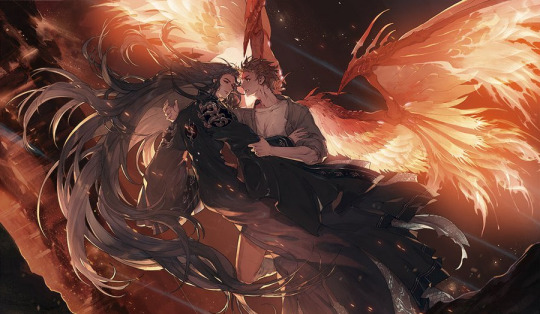
I’ll first just put up this picture from the preview of the official Korean release, because honestly the artbaiting is strong in this one. YES THOSE ARE HIS REAL WINGS! YES THAT IS HIS REAL HAIR!
Liehuo is a deft combination of past and present. It’s about how the past affects the present, and how it scars people along with the landscape. And, as it’s written by priest, there’s an optimism there as well, that there are things that can be done in the present—not to undo, but to resolve the traumas of the past, for all the cutting open of deformed scars and digging up of the bitterest pains that ‘resolution’ entails.
It’s gory work. Of the danmeis I’ve read, liehuo is by far the most intense, emotionally. The plot is also very gripping and action-packed. It’s hard to put down.
If you’ve read Sha Po Lang, then you’re probably familiar with this sort of optimism when priest writes about humanity and history on a large scale, this sort of exhilaration of feeling part of something larger. Only, in that novel, we see humanity in the midst of a turning point, a revolution, and for the most part, the characters are looking forward. In liehuo, we’re irresistibly drawn back into the past, because without it, we’re unable to understand the present, left powerless to fix the deeply entrenched issues underlying it.
And of course, because it’s priest, we’ll see these same themes being grappled with in the main relationship between Xuan Ji and Sheng Lingyuan.
So let’s introduce them:
Sheng Lingyuan
Sheng Lingyuan is an ancient emperor from three thousand years ago, who defended humanity against dire straits after a combination of environmental disaster and bad decisions among the previous generation led to a catastrophic war between humans and yaos (that is, sentient & intelligent animals who also have the ability to take human form). He successfully slayed the yao king, unified the country, and sealed Chiyuan, the fiery abyss that is the source of demonic energy in the world. Then, after reigning 21 years, he committed suicide by jumping into the extant fires of Chiyuan. The novel’s prologue opens with him as he hands the post to his nephew, and then jumps.
Cut to three thousand years later, when he is rudely awoken by some humans who are summoning him (he’s a demon, by the way), and he grudgingly awakens to see what’s up with the human world nowadays.
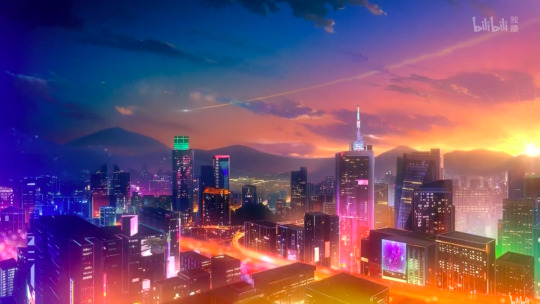
Turns out, it’s changed a lot.
Sheng Lingyuan is incredibly manipulative and cold-hearted, but he wasn’t always that way. Throughout the novel, his past is unraveled, and we understand what it took to carve out this inhuman Human Sovereign.
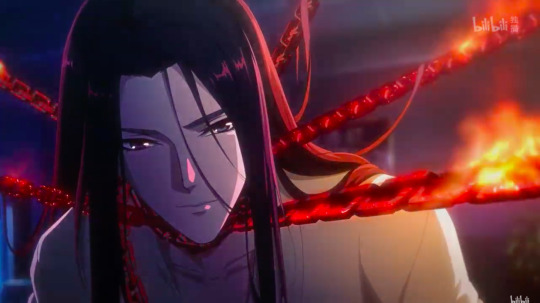
He is also the shou, by the way. Priest also says he’s the main character, but in reality, most of the novel is from Xuan Ji’s point of view, Sheng Lingyuan’s thoughts remaining a mystery more often than not.
Xuan Ji
Xuan Ji is very relatable on introduction: A millennial in his late twenties who once dreamed of living a great life of capitalistic success, only to be beaten down by the system, unable to even make it as a corporate slave. After growing jaded about the notion of leading a successful life in marketing, he sucks it up and sells himself to the government.
Specifically, the Anomaly Control Bureau, a secret government-affiliated bureau that deals with paranormal incidents across the country and acts as a governmental organization over people with special abilities (who are in fact the mixed-blood descendants of yaos and humans). Xuan Ji has special qualifications, as he can manipulate fire and metal, and also has wings he can make appear at will. However, not having a taste for the militaristic organization of the bureau’s field personnel, he goes for a logistics gig, and ends up being sent on a mission to Chiyuan on his first day at work as, somehow, the new director of the Aftercare Department. The Aftercare Department is basically the clean-up crew for the people on the field; it pays for damages and alters people’s memories after anomalous energy events, among other things.
This mission takes him on a crash-course with the newly-revived Sheng Lingyuan, and things unfold from there.
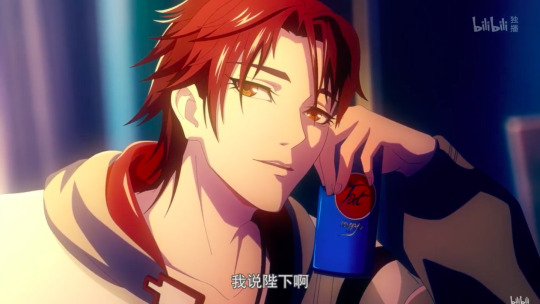
Xuan Ji is a super outgoing, shameless, funny guy.
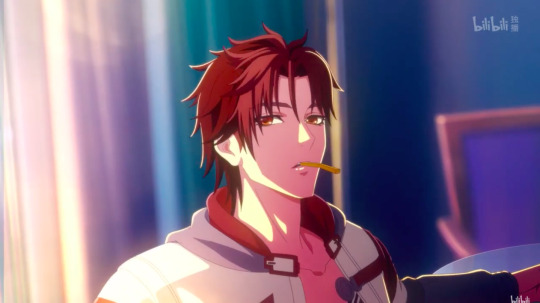
He’s also,,, very much birb.
However, behind this blithe, happy-go-lucky persona is a secret: In Ch.13, we learn that Xuan Ji isn’t a human at all. In fact, he doesn’t know what he is. Technically, special abilities shouldn’t have both fire and metal abilities, because the two elements have an overcoming interaction. And, absolutely no one else in the world has wings. In actuality, Xuan Ji woke up 10 years ago in Chiyuan without any memory of a past beyond a given name and some social & literary skills. All he knows is that he’s the so-called ‘Thirty-Sixth Nanming Fire Guardian’, assigned to guard over Chiyuan’s seal and keep the mysterious snow-white Li fire which can burn through anything. When he first flew out of Chiyuan 10 years ago, he (slightly by accident) stole the identity of someone who died in a car crash, allowing him to live a relatively normal life as a human.
At first, he and Sheng Lingyuan are engaged in a fight to the death, but afterwards, they become reluctant allies as they try to piece together who’s behind all the recent summoning of demons and attempts to reignite Chiyuan.
Okay, spoilers through Ch.56 below:
.
.
.
.
.
.
.
Over the course of the novel, as we excavate this fraught minefield of the past, we also learn about both Xuan Ji and Sheng Lingyuan’s shared past.
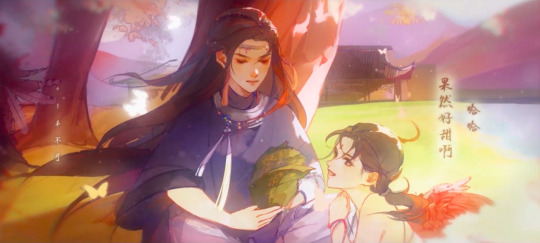
We see that the two of them were once childhood friends who were (literally) forged together as infants (in a sacrifice which turned Sheng Lingyuan into a heavenly demon and Xuan Ji into a sword spirit). As Xuan Ji slowly regains his memory in the present, we’re given a picture of how things used to be between them, before tragedy after tragedy separated them and eventually led Xuan Ji to become the fire guardian, left to guard Sheng Lingyuan’s primary legacy, the seal on Chiyuan.
(the picture above is a lie, by the way, Xuan Ji didn’t have a physical form back then, and had to rely on Sheng Lingyuan’s senses to perceive the world)
The pair of them also are left to work out all the torn threads of fate that had been tangled between them while they were both being carved into tools to fit into other people’s schemes. They have to wrestle with the lingering remnants of the structural inequality that infected the past down to the marrow, and they have to grapple with the plain fact that they can’t live without one another, that they self-destruct without one other, and dearly wish they could be free of that codependency. There is often a sense that love that is fated is the most terrible love. That any love that can survive three thousand years is the most harrowing torture.
And they’re left to answer the question: Is there only a past between them, and no future?
A question that haunts the whole novel, in one sense or another.
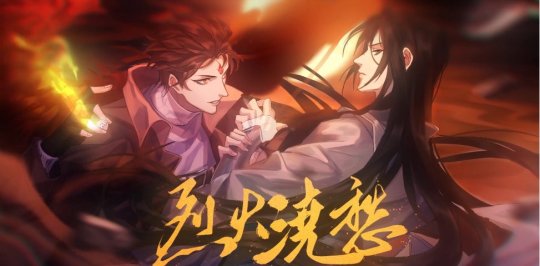
It’s a great novel! Pick it up!
#烈火浇愁#lie huo jiao chou#drowning sorrows in raging fire#priest#danmei recs#ask brim#anon#okay another thing though which I didn't quite get to here#is that liehuo is FRIGGIN HILARIOUS#pipi knows she's devastating you but she knows how to do it in a balanced way#you won't get much sugar from liehuo but you will get JOKES#the emperor and his chicken#all art in this promo came from the first PVs of the official Korean release、the donghua、and the audio drama
243 notes
·
View notes